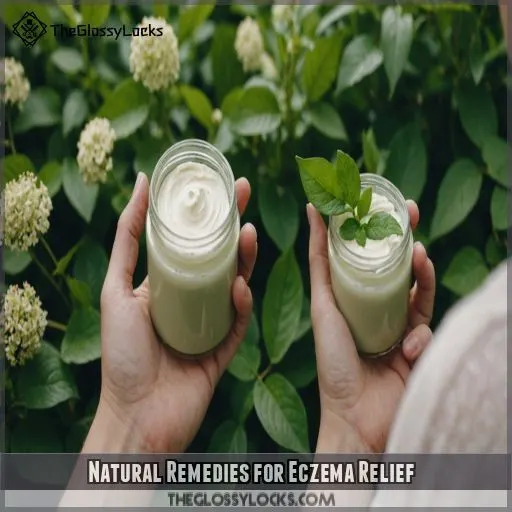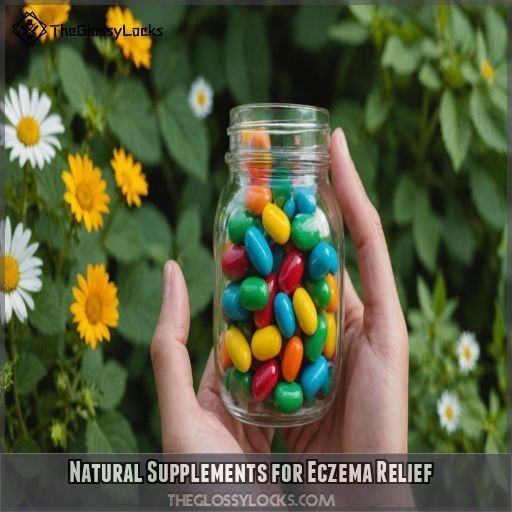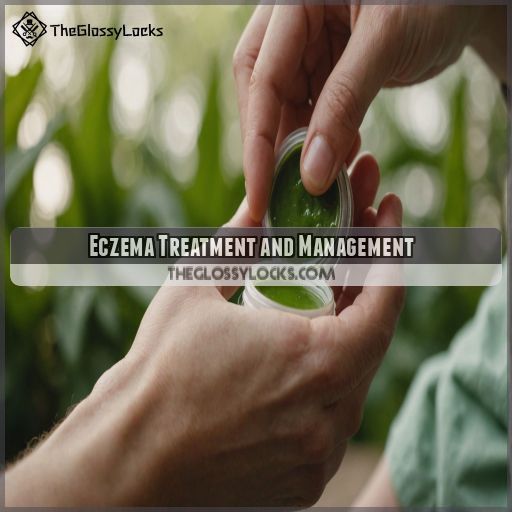This site is supported by our readers. We may earn a commission, at no cost to you, if you purchase through links.
 When eczema flare-ups have you scratching like there’s no tomorrow, natural remedies can be your best friend.
When eczema flare-ups have you scratching like there’s no tomorrow, natural remedies can be your best friend.
Picture coconut oil as a gentle hug for your skin, locking in moisture and soothing that itch.
Chamomile baths? They’re like a spa day for your epidermis, calming and comforting.
colloidal oatmeal works wonders too, wrapping your skin in an antioxidant-rich blanket.
These remedies offer evidence-backed relief, letting you regain control over your skin’s rebellion.
So, stop itching and start reaching for these home solutions to keep eczema at bay.
Curious about more skin-saving secrets? You’ve just scratched the surface!
Table Of Contents
- Key Takeaways
- Eczema Symptoms and Signs
- Causes and Triggers of Eczema
- Natural Remedies for Eczema Relief
- Dietary Changes for Eczema Management
- Preventing Eczema Flare-Ups
- Natural Supplements for Eczema Relief
- Eczema Treatment and Management
- Frequently Asked Questions (FAQs)
- How do you calm down eczema fast?
- How did I cured my eczema naturally?
- What is the best natural supplement for eczema?
- How do you detox your body from eczema?
- How can I tell if my eczema is infected?
- Can people with eczema swim in a pool or in the sea?
- Can certain foods cause eczema?
- Whats the best washing powder?
- Whats the best shampoo?
- Conclusion
Key Takeaways
- Embrace nature’s skin-soothing superstars, such as coconut oil, chamomile, and colloidal oatmeal, to calm eczema flare-ups and reclaim your comfort.
- Identify and avoid your personal eczema triggers, whether they are pesky dust mites, temperature changes, or certain foods – your skin will thank you.
- Boost your skin’s defenses from the inside out by loading up on anti-inflammatory omega-3s, probiotics, and GLA supplements for long-lasting relief.
- Work closely with your healthcare team to create a personalized eczema management plan, then stay vigilant by monitoring your progress and adjusting as needed.
Eczema Symptoms and Signs
When your child’s skin resembles a vibrant red patchwork quilt, you might be dealing with eczema. Recognizing these signs is important because understanding those bothersome itches is how you can start managing flare-ups effectively.
Common Symptoms of Eczema in Infants and Children
If your little one has eczema, you know the struggle all too well.
Those angry red patches, the incessant itching that keeps them up at night – it’s enough to make any parent feel helpless.
But take heart, mama – you’re not alone.
Eczema is incredibly common in babies and young kids, affecting up to 20% of them.
The good news? There are plenty of natural ways to soothe that irritated skin like using aloe vera.
.
Identifying Eczema Rashes and Skin Lesions
Figuring out eczema rashes and skin lesions isn’t rocket science, but it takes a keen eye. Look for constant changes:
- Eczema location: Common around the elbows, knees, and cheeks.
- Skin texture: Rough or bumpy.
- Color changes: Red to brownish-gray.
- Lesion types: Small, fluid-filled bumps.
With a dash of patience, you’ll become an atopic dermatitis detective!
Understanding Itchiness and Skin Discomfort
Eczema itch can feel like a relentless mosquito buzzing around your skin, driving you up the wall.
Scratching might seem like sweet relief but can hurt your skin barrier, causing more trouble.
For itch relief, try anti-itch ointments, cool compresses, and soothing agents like colloidal oatmeal or tea tree oil.
Use gentle soaps to tackle dryness and avoid sleep disruption.
Causes and Triggers of Eczema
You mightn’t realize it, but genes, your environment, and allergies could be having a party on your skin called eczema. Understanding how these factors mix and mingle is key to handling those itchy flare-ups!
The Role of Genetics in Eczema Development
Eczema often runs in families, and genetics play a key role in your susceptibility.
If your parents or grandparents had eczema, you’re more likely to develop it too.
Certain gene mutations can make your skin more sensitive and prone to inflammation.
While genetics load the gun, environmental triggers pull the trigger – so be mindful of what sets off your flare-ups.
Environmental Factors That Trigger Eczema
Although you can’t control every factor, understanding environmental triggers helps manage eczema. Here’s the short list to keep your skin smiling:
- Dust mites thrive in cozy spaces—reduce them with regular vacuuming.
- Air pollution can irritate your skin, so consider an air purifier.
- Temperature changes dry skin—adjust your home’s humidity for comfort.
Understanding the Connection Between Eczema and Allergies
You might think eczema’s just having fun with its allergy buddy. These two are often partners in crime—when the immune system throws a bit of a tantrum! Allergies, from food triggers to pollen, can flare up eczema just like a cat’s curiosity. Allergy testing helps, as do remedies like evening primrose oil or licorice cream.
| Allergy Tester | Food Trigger Tester |
|---|---|
| Yes | Could save the day! |
| No | Might miss something! |
| Needles | Brave it for relief! |
| Results time | Expect patience! |
| Control gained | Relief in sight! |
Natural Remedies for Eczema Relief
When eczema flares up, it can feel like your skin is throwing a tantrum, but plenty of natural remedies can help calm things down. From coconut oil to chamomile, these solutions offer soothing relief and are as easy to find as everyday pantry staples.
Coconut Oil for Treating Eczema Symptoms
Coconut oil is a natural powerhouse for soothing eczema-prone skin. Its deeply hydrating properties can help lock in moisture, preventing the dry, scaly patches that often accompany flare-ups. Try making a simple DIY coconut oil balm to apply directly to affected areas for instant relief. You can even mix in a few drops of calming essential oils for an extra skin-soothing boost.
- Coconut oil deeply hydrates and nourishes dry, irritated skin
- Forms a protective barrier to lock in moisture
- Absorbs quickly without leaving a greasy residue
- Provides natural anti-inflammatory and antimicrobial benefits
Apple Cider Vinegar for Reducing Inflammation
Just like coconut oil brings relief, apple cider vinegar tackles eczema inflammation with gusto. It’s your go-to secret weapon! But remember, always dilute to avoid skin irritation. It’s like a fire hose for itchy skin, quenching the flames. Here’s the lowdown in an easy table:
| Benefit | Usage |
|---|---|
| Reduces itchiness | Diluted use |
| Fights bacteria | Gentle dab |
| Boosts healing | Apply gently |
| Cost-effective | Budget-friendly |
Chamomile for Soothing Eczema-Prone Skin
Chamomile, a soothing herbal remedy, can help calm eczema-prone skin. Picture yourself sipping chamomile tea while your skin sighs in relief. Here’s how you can use it:
- Chamomile Bath: Relax and soak away the itch.
- Chamomile Lotion: Moisturize and soothe on the go.
- Chamomile Oil: Massage it in for silky relief.
- Chamomile Allergy Caution: Always test a small patch first.
Witch Hazel for Reducing Itchiness and Inflammation
Witch hazel is a trusty sidekick for your skin, offering eczema relief like no other.
It tackles itchiness and inflammation with superhero-like tannins, making it a staple in natural remedies for eczema flare-ups.
Think DIY solutions: just a splash of witch hazel, and your skin’s back to hero status.
Pair it with a carrier oil for dry skin or sunflower seed oil for added protection and comfort.
.
Colloidal Oatmeal for Moisturizing and Soothing the Skin
For a soothing skin-saver, try colloidal oatmeal. This finely ground oat powder packs a punch of antioxidants and anti-inflammatory properties to calm angry, eczema-prone skin. Whip up a DIY oatmeal mask or soak in an oatmeal bath to deeply hydrate and relieve that maddening itch. Your skin will thank you!
Dietary Changes for Eczema Management
When you think about managing eczema, what you eat plays a big role in keeping those itchy flare-ups at bay. With the right diet, you can load up on foods that soothe your skin and ditch the ones that leave you scratching more than your favorite mystery novel.
Foods That Trigger Eczema Flare-Ups
Moving from oils and oats to your plate, let’s chat foods that can spark eczema flare-ups. Your skin might rebel against:
- Dairy and Eggs: Tasty but could be triggers.
- Nuts and Soy: Common allergens causing itchiness.
- Gluten: Check labels to dodge this sneaky irritant.
Keep nails trimmed; bubble baths might seem tempting but opt for showers!
Foods That Help Reduce Eczema Symptoms
Previously, you discovered some pesky food triggers. Now, let’s talk solutions. Embrace an anti-inflammatory diet like reuniting with an old friend! Omega-3s and leafy greens can soothe eczema trouble, like a cozy blanket. Skip dairy if it stirs up woes. Here’s a tasty list for you:
| Foods | Benefits | Considerations |
|---|---|---|
| Omega-3s | Reduces inflammation | Fish, walnuts |
| Leafy greens | Rich in antioxidants | Spinach, kale |
| Turmeric | Anti-inflammatory spice | Add to meals |
| Sweet potatoes | High in beta-carotene | Alternative to grains |
| Berries | Packed with vitamin C | Choose low-sugar varieties |
The Role of Probiotics in Eczema Management
Probiotics may be your secret weapon against eczema. By supporting a healthy gut microbiome, certain probiotic strains can help calm inflammation and reduce eczema triggers from the inside out. Incorporating probiotic-rich foods or supplements into your diet could be a game-changer for managing those pesky flare-ups. Your skin will thank you!
GLA Supplements for Reducing Inflammation
Sometimes, the smallest things can make a big difference—like GLA supplements in your eczema diet. Packed with omega-6 fatty acids, they’re the secret weapon in battling stubborn inflammation and promoting skin health. Think of them as the peacekeepers in your skin’s civil war. Grab GLA for a smoother, healthier outlook, because happy skin makes for a happier you!
Preventing Eczema Flare-Ups
You can prevent eczema flare-ups by keeping your skin moisturized and avoiding trigger foods. Managing stress is also really important, so stock up on comfy socks and a sense of humor to tackle life’s challenges without causing an eczema meltdown.
Identifying and Avoiding Trigger Foods
Identifying and avoiding trigger foods is like steering clear of a food minefield. Start a food diary to spot common triggers that could be stirring up eczema. Try this:
- Elimination diet: cut out potential irritants.
- Cross-reactivity: watch for unexpected reactions.
- Hidden ingredients: read labels like a detective.
Managing Stress for Eczema Relief
When life gets hectic, your eczema may flare up. But don’t worry – managing stress can provide much-needed relief. Try deep breathing exercises, meditation, or gentle yoga to calm your mind and body. Journaling your thoughts and feelings can also be therapeutic. Remember, taking time for yourself is key to keeping eczema at bay.
Keeping the Skin Moisturized and Protected
After tackling stress, let’s talk skin uptime! Keeping eczema at bay is all about good skin hygiene and moisturizing. Use natural oils like coconut oil for barrier repair and sneak in a dash of humor: think of your skin as a thirsty cactus. Hydration is non-negotiable! Slap on some moisturizer, embrace sun protection, and say, "Hello, calm skin!
Natural Supplements for Eczema Relief
You’ve tried everything else, but have you considered natural supplements for calming eczema? From borage seed oil to omega-3 fatty acids, these can be your secret weapons in the fight against red, itchy skin.
Borage Seed Oil for Reducing Inflammation
You might’ve heard of borage seed oil, often called a secret weapon against inflammation. Borage oil benefits include high gamma-linolenic acid content that can soothe eczema. Curious about borage oil vs. flaxseed? They’re both great, but borage packs a punch for skin issues. A typical borage oil dosage is 1-3 grams daily. Try it, and your skin might thank you!
Probiotics for Supporting the Immune System
Probiotics could be your secret weapon against eczema flare-ups. By supporting your gut health, these friendly bacteria can give your immune system a much-needed boost. Try incorporating probiotic-rich foods like yogurt, kefir, or sauerkraut into your diet. For little ones, look for infant probiotic supplements to help soothe their sensitive skin.
Omega-3 Fatty Acids for Reducing Inflammation
Diving into Omega-3 sources, you might see a world of skin health benefits—think of fish oil as your secret weapon in reducing inflammation triggers. These supplements can tackle pesky food sensitivities that make skin itchy. Imagine beautiful, calm skin smiling back at you! So, when eczema‘s got you down, remember: a little Omega-3 might keep flare-ups at bay.
Eczema Treatment and Management
When you’re managing eczema, natural remedies might just be the superheroes your skin needs, but it’s essential to have a well-rounded treatment plan for stubborn acne.
. Work closely with your healthcare professional to tackle those itch monsters and adapt your approach as your skin’s story unfolds.
Creating a Personalized Eczema Treatment Plan
You’ve learned about natural supplements, now let’s tailor-make your holistic eczema plan! Start by spotting triggers like pesky allergens. Consider lifestyle changes that focus on soothing flare-ups. Here’s a simple checklist:
- Trigger identification
- Embrace home remedies
- Moisturize regularly
- Minimize stress
Working With a Healthcare Professional for Eczema Management
When dealing with eczema, teaming up with a healthcare professional can make all the difference. They’ll help pinpoint the root causes, recommend the right treatments, and guide you through managing this chronic condition. Don’t go it alone – let the experts lend a hand and get your eczema under control for good.
Monitoring Progress and Adjusting Treatment as Needed
You’re partnering with a healthcare professional, now grab your magnifying glass! Monitoring progress is like watching a detective at work. Keep an eczema diary—jot down skin changes, treatment effectiveness, flare-up triggers, and natural remedies tried. You’ll be Sherlock in no time, adjusting strategies based on clues to maintain smooth skin. Stay engaged, you’ve got this!
Frequently Asked Questions (FAQs)
How do you calm down eczema fast?
Tame your skin’s tempest with soothing coconut oil or calming chamomile tea baths. Try an oatmeal bath for a comforting embrace, while aloe vera stands guard. Remember, patience is key; it’s a marathon, not a sprint!
How did I cured my eczema naturally?
You’ve battled eczema by embracing nature’s bounty! Swapping lotions for coconut oil to hydrate, soothing skin with chamomile, and adding apple cider vinegar to your regimen, you made eczema hit the road. Keep it up!
What is the best natural supplement for eczema?
You’re seeking relief from eczema, and vitamin D supplements might just be your golden ticket. Studies suggest it reduces eczema symptoms, providing a ray of hope for smoother skin (Source).
How do you detox your body from eczema?
Wondering how to detox from eczema? The secret lies in nourishing your skin from within! By incorporating anti-inflammatory foods and supplements, you can calm flare-ups and restore your skin’s natural glow. Ready to take control of your eczema journey?
How can I tell if my eczema is infected?
If your eczema’s red, swollen, oozes, and feels hot, it’s like your skin’s partying without you! That could mean an infection. Keep it clean and mosey over to a doctor if it doesn’t calm down.
Can people with eczema swim in a pool or in the sea?
Imagine dancing on a fine line—swimming can soothe or irritate your eczema. Saltwater’s a natural balm, while chlorine might be your skin’s foe. Always moisturize before and after to armor your skin against these watery adventures.
Can certain foods cause eczema?
You bet your bottom dollar, certain foods can cause eczema flare-ups. Common culprits include dairy, nuts, eggs, and wheat. Your skin’s like a drama queen, overreacting to triggers! Keeping a food diary can help you identify them.
Whats the best washing powder?
Imagine Sarah found relief by switching to a hypoallergenic, fragrance-free detergent like Tide Free & Gentle. It’s a godsend for sensitive skin, reducing itchy rashes. Don’t let laundry become enemy number one; choose wisely!
Whats the best shampoo?
Choosing the best shampoo? It’s a bit like picking the perfect wine—depends on your style! For oily scalp, look for clarifying ones. For dryness, hydrating is key. Always check ingredients like sulfates, which can be harsh.
Conclusion
Embrace effective home solutions by exploring natural remedies for hair growth for eczema flare-ups.
.
Whether you’re slathering on skin-saving coconut oil or sipping soothing chamomile tea, it’s all about nurturing your skin naturally.
By identifying irritants, incorporating anti-inflammatory foods, and enlisting a trove of nature’s finest healers like colloidal oatmeal, you can combat eczema’s exasperating itch.
Plus, staying stress-free is essential.
So, swap scratching for soothing strategies, and skin success is just around the corner.
What’s your next soothing step?










